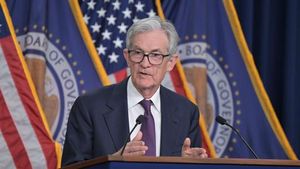President Donald Trump's recent announcement of expansive global tariffs has sent shockwaves through various sectors of the U.S. economy, with particular emphasis on the beef and pharmaceutical industries. As of April 2, 2025, Trump revealed a list of "reciprocal" tariffs that includes significant increases on imports from many countries, including a staggering 34% increase on imports from China, bringing the total tariff on that nation to 54% since he took office in January. This announcement has raised concerns about market volatility and the potential for economic repercussions that could affect consumers and businesses alike.
The beef industry, already grappling with a declining national herd at its smallest size in over 50 years, faces uncertainty as tariffs are set to impact both imports and exports. The tariffs include a 10% baseline on all countries, with specific rates for nations such as Japan (24%), Taiwan (32%), and the European Union (20%). Notably, Australia, Brazil, New Zealand, and Chile, which regularly ship frozen beef to the U.S., will also incur a 10% tariff. Adam Murray, a beef extension specialist at Cornell University, emphasizes the importance of imports in the beef supply chain, stating, "We’re producing a lot of higher-quality beef," and that imported lean beef is vital for mixing with U.S. fat trimmings to meet domestic demand for ground beef. Murray notes that 50% of the beef consumed in America is ground beef, highlighting its significance in the market.
However, the uncertainty surrounding the tariffs has left many in the beef industry anxious. Derrell Peel, an agricultural economist from Oklahoma State University, points out that the details of the tariffs are still unknown, which leads to chaos in the market. He explains, "Uncertainty is not good for markets. Producers are trying to figure out what is going on, and no one knows." The interconnectedness of the American, Canadian, and Mexican beef sectors further complicates the situation, as thousands of tons of beef cross borders annually. Peel adds, "We’ve developed a very integrated cattle and beef market. It’s thousands of products," indicating the complexity of the trade relationships.
Kelly Schmidt, CEO of the Minnesota Beef Council, echoes the sentiment of uncertainty, expressing concerns about retaliatory tariffs that could follow. He states, "We don’t know what is going to happen," as the industry braces for potential fallout. The U.S. Meat Export Federation (USMEF) underscores the importance of exports, which added over $10 billion in value in 2024, up 5% from the previous year. Joe Schuele, vice president of communications for USMEF, mentions, "Our major concern is retaliation," but he reassures that the domestic beef market remains robust.
In parallel, the pharmaceutical sector is also feeling the pressure from Trump's proposed tariffs. Stocks of Indian pharmaceutical companies, including Aurobindo Pharma and Lupin, fell by up to 7% following Trump's hints at imminent tariffs on pharmaceutical imports. The sector, which had previously been exempt from tariffs, is now facing potential scrutiny under Section 232 of the Trade Expansion Act of 1962. This section allows the U.S. government to restrict imports deemed a threat to national security. Experts warn that while tariffs on pharmaceuticals had been avoided, the looming possibility of such tariffs introduces significant challenges for the industry.
Arvind Sharma, a partner at Shardul Amarchand Mangaldas & Co., emphasizes the need for Indian pharmaceutical companies to engage proactively with policymakers to ensure transparency around supply chain security and quality standards. He states, "Proactive preparedness and strategic dialogue will be key to mitigating risks associated with potential Section 232 actions." The Indian pharmaceutical sector, which exported $8 billion worth of products to the U.S. in fiscal 2024, supplies 40% of the generics consumed in the country. This heavy reliance on the U.S. market makes the potential for tariffs particularly concerning.
The economic implications of these tariffs are already being felt as consumers brace for price increases across various sectors. Economists have warned that Trump's overall tariffs could lead to a 2.3% rise in price levels, translating to an average loss of $3,800 in purchasing power per household based on 2024 dollars. Stephen Miran, who leads the president’s Council of Economic Advisers, acknowledged that the economy could experience a "bumpy" period as these tariffs take effect. Meanwhile, Alan Detmeister, a former Federal Reserve economist, predicts that inflation could spike to around 4.5% by the end of the year, further straining the financial capabilities of American households.
Mark Zandi, chief economist at Moody's Analytics, warns that if the full force of Trump's tariffs is implemented and other nations retaliate, a recession could hit imminently, with growth potentially falling by about 2% and unemployment soaring to 7.5%. This scenario paints a grim picture for the labor market, which had already begun to cool before the onset of the trade war. Economists have started to raise their unemployment forecasts significantly, with projections indicating a near 5% unemployment rate this year.
As the U.S. grapples with these economic challenges, the forestry industry in British Columbia is also navigating its own set of concerns. On April 3, 2025, the BC Council of Forest Industries Conference brought together around 630 forestry professionals to discuss the future of the sector amidst declining trade relations with the U.S. Former premier Glen Clark highlighted the various challenges facing the industry, including wildfires and the mountain pine beetle, and stressed the need for diversification in trade. He stated, "We need to diversify our trade as well. It’s going to be less dependent on the United States. The best opportunity for British Columbia is Japan, where we’ve lost market share in recent years."
The conference also addressed the impact of forestry on First Nations communities, with Lennard Joe, CEO of the First Nations Forestry Council, emphasizing the importance of opening doors for future generations. He stated, "There are many existing relationships — both business and governance — that have already proven successful." John Rustad, Leader of the Official Opposition in BC, expressed his concern about the state of the Prince George forestry industry and called for government action to support the sector.
In conclusion, the ramifications of Trump's tariffs are being felt across multiple sectors, with the beef and pharmaceutical industries facing significant challenges and uncertainty. As the U.S. economy braces for potential inflation and recession, industries like forestry in Canada are also adapting to shifting trade dynamics. The outcomes of these tariffs remain to be seen, but the stakes are undoubtedly high for producers, consumers, and policymakers alike.







